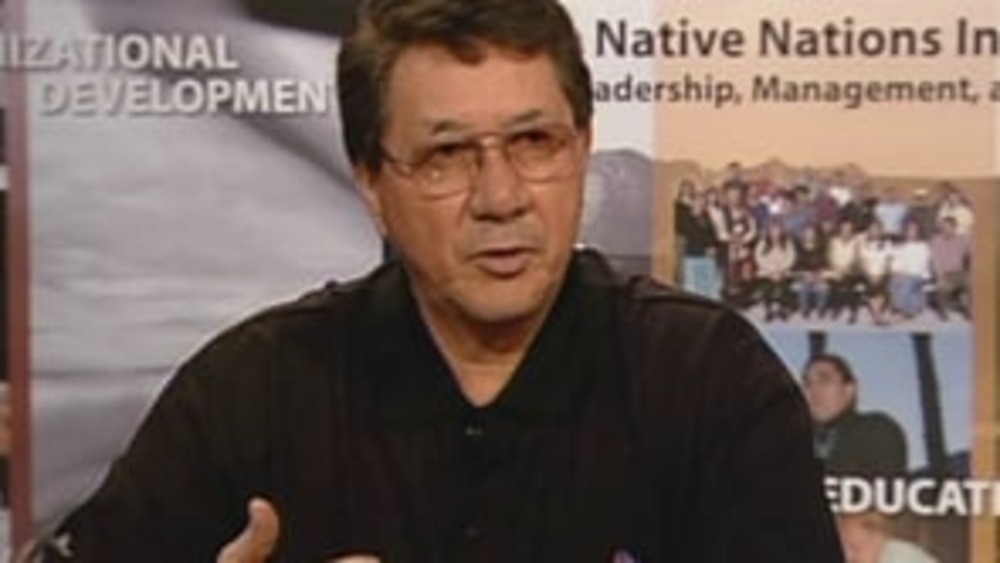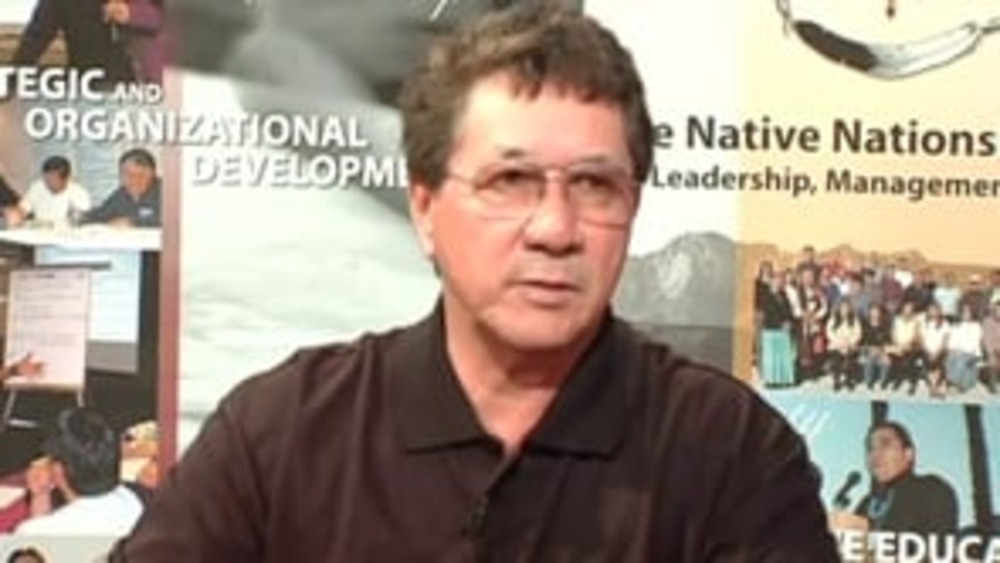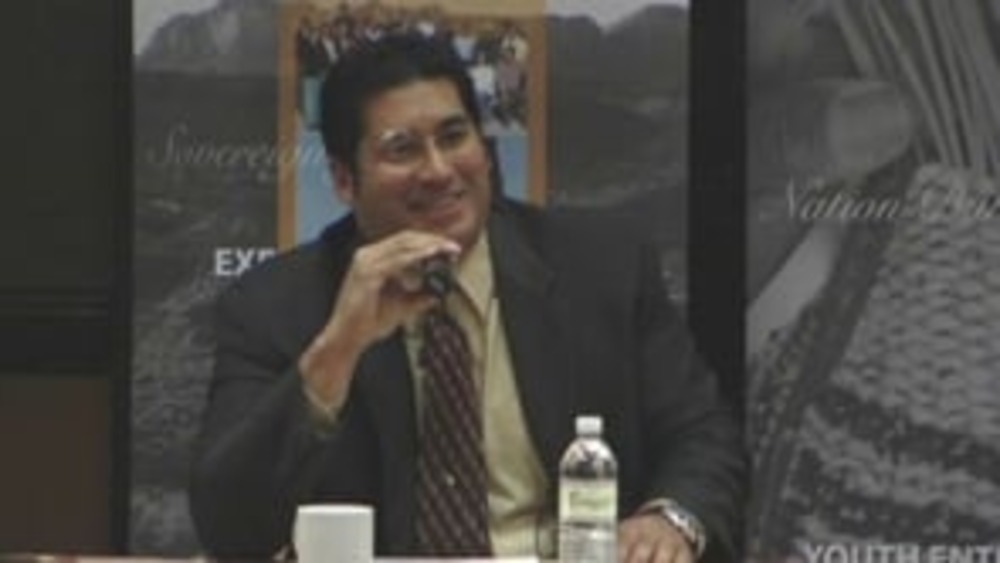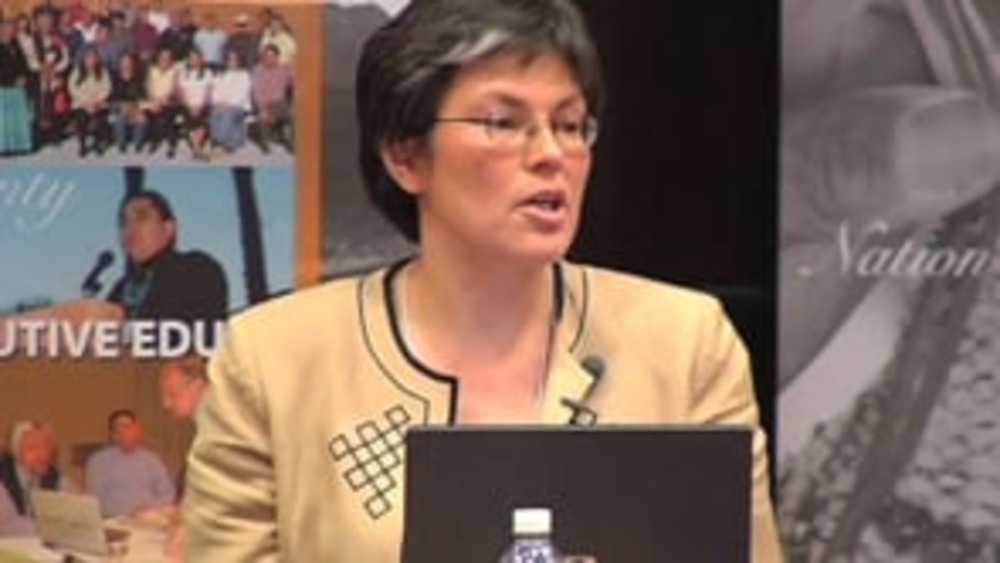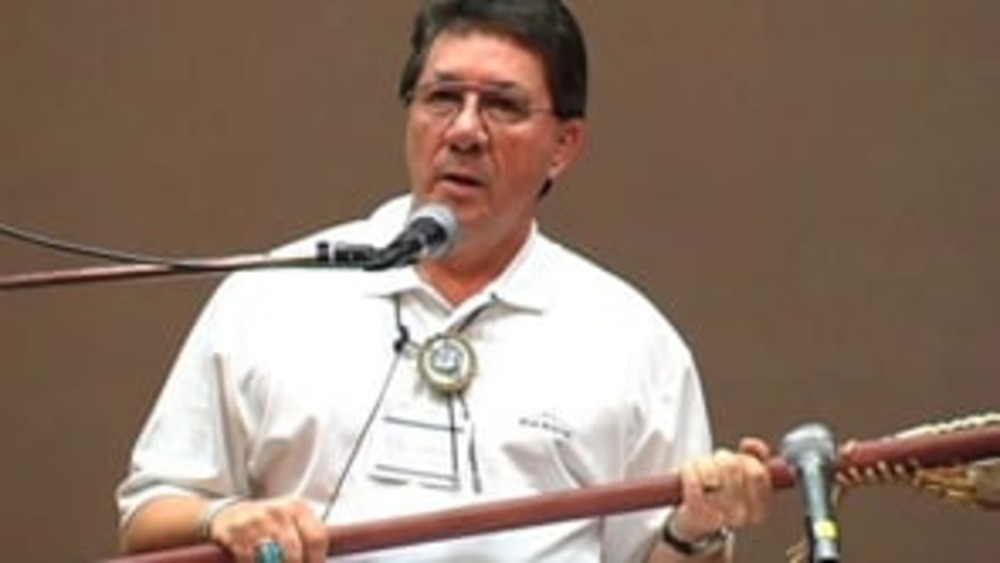Mohawk Council of Akwesasne Grand Chief Michael K. Mitchell reflects on his role as a modern elected leader of his nation. Mitchell encourages small changes in terminology and ideology that in turn will change the community's mindset about nation rebuilding and what is possible.
Additional Information
Mitchell, Michael K. "What I Wish I Knew Before I Took Office." Emerging Leaders Seminar. Native Nations Institute for Leadership, Management, and Policy, University of Arizona. Tucson, Arizona. March 25, 2009. Presentation.
Transcript
"First, I want to start by offering my congratulations for each and every new member of council, chief or council member or administrator. I imagine that's the purpose that you're all here. What can we learn from one another? I try to make my presentation simple. He was talking about a book that I'm working on. I took some notes from there and it's been passed around. You'll see it. It says 'My Introduction to Akwesasne Politics.' I want to go back to being a chief in Canada. And along the way that I'm telling my story, I want you to think about what commonalities that we have on reservations in the [United] States, reservation politics and reserve politics in Canada. A while ago it was mentioned that we are governed by federal legislation in Canada called the Indian Act. I guess the closest thing that comes to it in the States is the Indian Reorganization [Act] law. My story that I want to share with you pertains to, a lot to people that raised me. My greatest influence was my grandfather and grandmother and how they raised me. They taught me the traditions, the spiritual life at a very young age growing up, the language; and I was groomed to be a leader in the Longhouse, in the traditional governance. And somewhere along the way, life took a detour because I didn't wind up being a traditional chief; I wound up being an elected chief for over 20 years. And that's the story that I want to share with you.
You see, in every Native American community -- large or small, medium, close to urban or way off isolated area -- we have our politics. And when election comes around, there's different groups that make up the society. You're either poor, or there's a casino or revenue base of some kind, and it controls the lifestyle of the people. You're either in or out. Religion: you're either very traditional or very Christian. Very seldom is there a group that's kind of like both. So from 30, 40, 50 years ago, 100 years to recent years, that has been the trend. Well, my grandfather was a strong traditional. He hated the elected system. And his followers, and his people that he's part of in the Longhouse, dead set against the elected system of governance. And so they belong to a traditional governance of the Iroquois Confederacy, which is the Mohawks, the Oneidas, Onondagas, Cayugas, Senecas, and later the Tuscaroras. And that union, as ancient as it was, followed a very traditional form of governance. The women actually put up the leaders. And according to the clans, if they were not good leaders, the women would take you out of office. And so those were the principles of governance, as compared to a modern elected system. And in Akwesasne we were governed under the Indian Act, a federal national legislation.
You would run for office for two years, depending on what is in place, economically and the mood. Basically, in Akwesasne, you get in office as a councilor and 12 chiefs sat around the table. And out of the 12 they would elect a head chief out of the 12 who would become the head chief. But it's a system that was in place for a long time. Well, I was elected in that system. And the story that I want to share with you is, "˜How did I get involved in the elected system?' Well, over the last hundred years in Akwesasne, about every ten years we'd have a war of some kind between the elected system on the Canadian side and the tribal elected system on the American side and the traditional leaders. Three governments; two elected and one traditional. And it seems like we have a crisis every ten years of some kind internally. And there's deep-seated hatred and mistrust among the leadership of the three governments. As it went on, in my time I saw three major ones where we're pointing guns at each other, Native Americans pointing guns at each other. It was a time when the elders said, "˜We've got to stop this. And we've got to try to send some of our people who are on the traditional side to run in an elected system and see if we can change the mindset of the other half.'
You see, in Canada we were educated, the majority, by what we call the Indian residential school system. The other part was the reserve day system. Church had a lot to do with it; government had a lot to do with it. And how you grew up in the Native community depended on what you were taught. And so one group said, "˜We're the Christian side; we're a lot better than the pagan side.' And so that internal difference started from the day that you were born. So there could be no peace. Well, in my time, I ran a cultural center in the community. And I didn't make any difference in treating people whether they were traditional or elected followers or Christian. My purpose was to serve everyone. And when wars started we always stayed neutral. So this idea of finding a person to run, with the traditional side saying, "˜We ought to try to get Mike to get into that elected system and see if he can turn things around'; this is after one of our wars. Well, after a lot of discussions, a lot of thinking, 'What was the idea behind this?,' I agreed to run. And the story that's in those documents that we passed around was my adventure in being a modern-day elected leader. It's pretty rough.
The first, after the elections, I got elected by the 12 chiefs to be the head chief. They said, "˜We'll string him up in a couple weeks.' My office was constantly occupied for six months. And the only way it ended was a Mohawk fighting another Mohawk, in this case fighting the previous chief, before peace prevailed. But following that, what would a person do in a situation like that was tackle the things that affected us from the outside; and that was the Department of Indian Affairs, the way they told us to govern. Mostly through the two years somebody was protesting an election. You could go to court; you could appeal to the government. So in that first six months we had meetings in the community and asked them if we could bring home and let the community make their own election law, devise an election code where things would be settled at home. When we finished that, we had a vote. And when the people voted -- see Longhouse people, traditional people don't vote. So the first act was to get the elected followers to vote on an issue. After that was finished, then I went over to the traditional side and asked them to have clan meetings. And by majority or consensus they would arrive at a decision on a traditional manner. However, both sides agreed that we should control our own elective system. And when they found out that they both agree on a system, they looked at each other and said, "˜Geez, we actually agreed on something.'
Then we tackled membership. Who should be a member of our nation, and does culture and tradition come into it? Does a clan, having a clan have something to do with being a member? Who gets to be a member? Do you have to have both parents be Native? Is there room for a person who's half? And all those questions went out into our discussions in the community. And at the end, another year later, we had another vote. And little by little we started chipping away, taking these authorities away from Ottawa, from the Indian Act, and bringing it home to a community-based process. And in these meetings we invited finally the tribe to sit with us and the Nation council to sit. I brought out agenda items like land claims, tourism, economic development, just to look at it, inviting them for their opinions. What could we do as one people?
Akwesasne, the international borderline runs right through the middle of our territory. One half is in Canada, the other half is in the United States. One half that is in Canada is in Ontario and the other half in Canada is in Quebec. So you can't be more divided than that. And then of course, historically, the mindset of the people is always one of division. Now you learn a great lesson. Being under the Indian Act election only gave you two years. And when I became chief they were in a deficit of over $2.5 million and they only had a $5 million operating budget. That's because on the outside the government controlled everything. The Indian agent had left recently but all his people still controlled...if you want education dollars you have to ask a DIA [Department of Indian Affairs] official to come down and look at your proposal, what you want to do. He'll decide how much money you're going to get. If you want economic development, if you want housing, capital works, it's the same thing. Little by little we trained our people. First they came home, second let's make our own decisions, let's do our own planning and start taking that authority away from Indian Affairs. And it's this little community-based mindset.
I'm going back a little bit. We didn't think like Mohawk Nation. We had no concept of a nation mentality. Over the last hundred years or so, we were engrained in thinking Indian Act way. We were 'Band Indians.' We were the St. Regis Band, we went to the St. Regis Band office, we had a Band administrator; our community was a small Mohawk band of Indians. So the terminology was obvious that the federal government had engrained in us to think less of ourselves. If you said 'Nation,' you were an enemy; you were hostile. Well, my grandfather was a hostile; he was traditional and he said our people are a nation. So that mentality only came from a certain group of people. So I started asking the council to have meetings in the community to throw issues out to the community. You had a lot of public meetings. And in those meetings we raised the issue, 'Why do we consider ourselves to be inferior?' And we went through a change of name from the St. Regis Band to the Mohawks of Akwesasne. Akwesasne is our traditional Mohawk name. That passed. Then we made a flag. That passed. A community flag to fly with our nation flag. Council changed the name from the St. Regis Band Council to the Mohawk Council of Akwesasne. We're no longer a reserve or a reservation, we were a territory. 'You have entered the Territory of the Mohawk Nation.' And it's just a mentality of the young people thinking differently of themselves. This is a useful education process because the community's in deficit, you ain't going to be able to spend a whole lot of money, so let's look at our mentality. How do we view ourselves, especially the ones that are coming up, the next generation? How does that impact their thinking? And so we did that. We started concentrating on who we are, how do we perceive ourselves as [Mohawk language], as First Nations. And by the time we got done we made a whole mess of changes that was fun.
My council that made up the governance, a lot of the old timers couldn't get away from saying the word 'band.' So we made a game. I put a cup in the middle of the council table and asked all the chiefs, "˜If any of you say 'band' in our meetings anytime in our discussions, I want you to put a quarter in there.' Pretty soon we have to have three cups in there because they kept tripping up. But they voluntarily put in there, "˜I'll get it, I'll get it.' And he'd mess up again, he'd put a couple more dollars in there. Pretty soon we had a big coffee fund set aside. Well, the administration offices heard about this little nation-building game and they started doing that and it afflicted the staff. And people in the community started hearing about this little game and it affected them too, but it affected them in a positive way because now we're all thinking that. Undoing a mindset that was given to us.
I will ask, 'What could I have learned coming into a system, an elected system, a divided community, deep roots in hatred?' Well, I would have probably, as a leader, learned more about the history of the Indian Act and how Indian Affairs does its business because for 20 years it was a game, a chess game of trying to turn things around -- put more tradition, more community values, more awareness, preparing the next generation -- and knowing that you had to go against the stumbling blocks of government interference from the outside. It was a nice battle, counter battles, but that's what I would have really like to have seen is the government saying, "˜You want to take over your governance. You want a representation of your people in getting them involved in your politics. We'll step out of the way.' Eventually they did, but it was always through different battles that we had to go through. But now the people are in a fighting mood.
And I just want to finish off by saying nowadays they find a way to sit together. The tribal council, the Mohawk council, and the Nation council actually sit together and look at the issue that impacts the community. And so there are many things that you always learn and there are many things that you are grateful that you've given to the community and they're nation-minded. They're proud of their Mohawk heritage, it's engrained in them. Governance is an issue that will always be there because one side is American, the other side is Canadian and that international border plays havoc with us.
We are well known in North America as the smuggling capital. We smuggle cigarettes, make a lot of money doing it, too. And so within our community there's a little power struggle. The business community have a lot of influence, have a lot of power underground by the dark-of-night economy. And then you try to create a legitimate economy. So there are always going to be things like that that are going to happen, but we're talking to each other. Drugs is a problem of being stuff that's smuggled across; guns, now aliens, terrorism. When 9/11 happened they thought they came through Akwesasne. CNN had these maps, "˜This Mohawk Nation community here, that's where they came from.' A few weeks later they said, "˜Oh, we might have made a mistake,' but we get blamed right away.
What did I learn, what did the community learn about our politics and the way we do things? Talk to each other, talk to your enemy, talk to your elder, talk to your people in the community. So that's my story."

